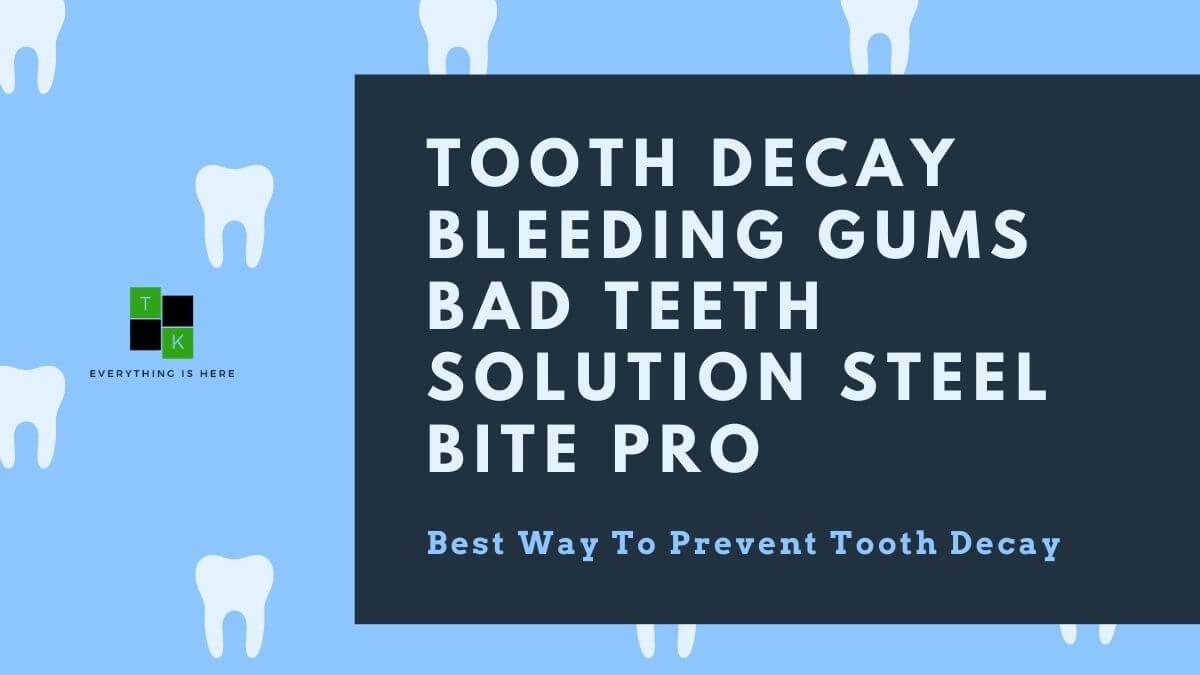Tooth Decay Bleeding Gums: In order for tooth decay to be developed in a tooth, that tooth must have acid producing bacteria around it, along with food for the bacteria to feed upon. Teeth that are susceptible to decay will have little to no fluoride in the enamel to fight the plaque. Fluoride can destroy decay, although it won’t be able to do much once the decay has started to eat the teeth. Poor hygiene habits will allow the plaque and tartar to build up around teeth and speed up the process of decay. Even though your mouth has a lot of bacteria that is always present, only one type will generate the acid that results in tooth decay. Some people have active decay that is always present in their mouths. Parents with active decay can easily pass the decay on to a child or loved one through eating, drinking from the same glass, or even kissing.
All About Tooth Decay
Once the decay has settled in the tooth’s enamel, it will progress very slow. Once it has made it through to the second layer of the enamel, it will spread faster as it heads towards the pulp. The pulp is a vital area of the tooth, as it contains the nerves and blood supply. This is where the pain will be the most intense, as the decay will start to eat at the nerves.
Although decay can take 2 – 3 years to get through the enamel, it can make it from the dentin to the pulp in less than a year. Once it makes it to the dentin, the decay can destroy most of the tooth structure in a matter of weeks – or months. The most preventable type of tooth decay, known as smooth decay, also grows the slowest. It starts out as a white spot in the tooth, where the bacteria dissolves the enamel. Smooth decay is very common with those 20 – 30 years of age.
Pit or fissure decay is a bit more serious, forming along the narrow grooves in the chewing side of the molars. It progresses more rapidly and can eat your teeth a lot faster than smooth decay. Due to the grooves being so narrow, it can be hard to clean them with regular bushing. Even though you may brush on a regular basis, this type of decay is hard to prevent without going to the dentist for your regular checkups and cleaning.
The last type of decay, known as root decay, begins on the surface of the root. Root decay is common with middle-aged individuals. It is normally the result of dry mouth, a lot of sugar, or not taking care of your teeth. Root decay is the most difficult to prevent, and the most serious type of tooth decay. It can eat teeth fast, leaving you no choice but to get the affected teeth removed.
Bad Teeth Solution Steel Bite Pro
Tooth decay is no laughing matter, and should always be treated before it has time to spread and affect more of your teeth. If you visit your dentist for your regular checkups and cleaning, you can normally prevent it from starting. You should always brush on a daily basis and use mouthwash such as Scope or Listerine to kill bacteria. Bacteria is always present in your mouth, although you can use mouthwash to kill it. If you take care of your teeth and follow the advice of your dentist, you can normally prevent tooth decay before it has a chance to eat at your teeth.
Natural Solution For Tooth and Gum Health
Despite the initiation of the latest tools for oral hygiene such as toothpaste and mouthwashes and the advancement in dental science, a number of people experience tooth and gum-related diseases these days than ever before.
We can’t ignore that tooth decay is really the most prevailing disease of modern civilization. Modern diet and refined foods, cereals, processed or synthetic foods lead to a condition of spongy and receding gums. A range of gum diseases such as pyorrhea and gingivitis are also an increased outcome of our modern living habits.

Mouthwashes and chemical-based toothpaste many times worsen the problem that they claim to correct, these are the processed and synthetic formulations such as. Dreadfully the consequences can be even more severe. Alcohol in mouthwashes is associated with both oral and throat cancer. Fluoride in toothpaste has already been linked to cancer.
The question arises that why use these toothpaste and mouthwashes when nature has bestowed a wealth of herbs and fruit that have an exceptional consequence on oral health with absolutely no side effects. These miracles of nature are so powerful that our forefathers have used them for thousands of years. As an example, just try pressing a clove between your teeth in case of toothaches and feel the pain vanish!!
Tooth Decay Natures solution For Oral Health and Hygiene
To establish a good number efficient method for reducing plaque formation and the level of bacteria on teeth surface it was found that micro-organisms found in inflamed gums are resistant to antibiotics but not to antibacterial plant extracts like Neem. And unlike antibiotics, antibacterial plant extracts produced no allergy in the gingival that could inhibit their effectiveness.
- Neem extracts have been very useful in destroying cavity-causing bacteria, enhancing mouth immunity, and preventing tartar and plaque buildup. They have helped millions of people avoid cavities.
Neem can be a painless way to avoid severe dental problems. In a German study, 70 patients with pyorrhea in varying stages showed significant improvement after just 5 to 10 treatments with neem-based products. Bleeding gums had healed and the secretion from pockets around the teeth had stopped. The bluish-colored gums returned to a healthy pale pink color.
Neem Twigs have been used by thousands of people for hundreds of years as an extremely effective method of total oral hygiene.
- The Ayurvedic and medicinal properties of the Babul tree (Acacia Arabica) are also well known. This natural ingredient strengthens the root of the teeth, cleans and maintains the whiteness of the teeth.
- Clove and its oil is a complete wonder therapy for toothaches and gum disorders. It is an excellent pain reliever and often dentists use it to numb the gums prior to administering a shot. Besides this clove oil is also useful in relieving sore throats and is a powerful breath freshener.
- Besides, neem, babul, and clove, there are a number of vital herbs and natural oils that work wonders on tooth and gum health. A mixture of Eucalyptus, clove, and Spearmint is extremely potent in eliminating harmful bacterial build-up in the mouth and a very good cleansing agent.
- Majuphal is a fruit that has an outstanding astringent property and it reduces over secretion of mucous. Its hemostatic property ensures its beneficial effect on bleeding gums and on gingivitis.
- The Catechu (Khadir) bark is tremendously beneficial in cases of toothache and spongy gums. Ginger oil is an astringent for teeth.
- Ginger is an exceptional astringent wash for the teeth while lemon is a good whitener.
🚨 Stay Updated with TopKhoj! 🚨
Get the latest tech news, deals, and exclusive offers first!
📰 Visit News Section📲 Join our Telegram Channel for real-time updates and best deals!
🔗 Join Telegram Now💡 Stay informed and never miss a great deal with TopKhoj!
⚠️ Disclaimer: Any link provided in the article related to a product or service will redirect you to our affiliate partner(s)' website, which are affiliate links. This means that if you make a purchase through these links, we may earn a commission at no extra cost to you. This commission helps support our blog and our work.
🔔 All prices mentioned above are subject to change based on current offers and availability on e-commerce platforms. Please check the latest price and product details on the product page before making a purchase.







